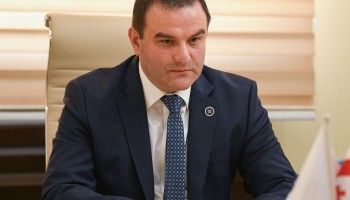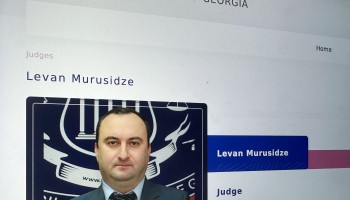Ivanishvili made his fortune in Russia in the 1990s, before returning to his home country and founding the ruling Georgian Dream party in 2012. He became prime minister that year, but stepped down in November 2013, and the party chose another leader.
Ivanishvili has not held public office since then, although he has served as the party’s chairman and honorary chairman. Ivanishvili was widely perceived to be influential behind the scenes regardless of having any official position in the party, while critics have accused him of acting in Russia’s interests.
Opposition parliamentarians took up that argument after Georgian Dream announced Ivanishvili’s return to public politics at a party conference in the capital, Tbilisi, on Tuesday evening.
“With a Russian oligarch at the head, Georgia cannot join the European Union, and not a single Georgian wants to join the Russian Federation,” said Ana Natsvlishvili, a parliamentarian with the Lelo party.
“Ivanishvili is the way to defeat, and Georgia deserves victory,” she told OCCRP.
Georgian Dream has refuted accusations that it is pro-Russia, and Prime Minister Irakli Kobakhidze said at Tuesday’s event that his party was aligned with Europe.
“This is not just an election but a referendum,” Kobakhidze, as he announced the party’s top 20 candidates. “The people must choose between war or peace, moral degeneration or traditional values, a dark past or a bright, European future.”
For some critics, however, talk of “moral degeneration or traditional values” carries echoes of authoritarian governments, and signals a shift away from protections for minority communities that are enshrined in European law.
In a September 6 letter to Georgian Parliamentary Chairman Shalva Papuashvili, the Council of Europe’s human rights commission warned that proposed “family values” legislation would target lesbian, gay, bisexual, transgender or intersex (LGBTI) people.
“The draft law provides a legal footing for discrimination against LGBTI people and appears to be at variance with the European Convention on Human Rights,” wrote Commissioner Michael O’Flaherty.
In another controversial move, Georgian Dream passed a law recently that mandates non-governmental organizations and independent media outlets receiving funds from abroad to register as agents of foreign influence.
Critics say the law is similar to Russian legislation that has been used to crack down on dissent and consolidate political power, and thousands of Georgians protested against it for weeks.
The author of that legislation, Sozar Subari, was included on Georgian Dream’s new list of top 20 candidates, along with Ivanishvili.
Ivanishvili’s return to politics is a bad sign for democracy in Georgia, according to Giorgi Davituri of the Institute for Development of Freedom of Information, a civil society group. He pointed to promises by Ivanishvili to use legal means to eliminate some opposition parties from politics.
"The presence of Bidzina Ivanishvili as first on the list means the pro-Russian narratives and methods by which Georgian Dream is going to make the opposition disappear from the radar –– as they say themselves –– will be used if they win elections,” said Davituri.
“And yes, this means that if the Georgian Dream wins, he will be given the opportunity to conduct Russian policy in Georgia,” Davituri added.
Georgian Dream did not respond by publication to phone calls and an emailed request for comment on accusations from critics that the party is becoming increasingly authoritarian, and aligned with Russia.
After the October 26 election, parliamentary seats will be distributed according to the proportion of votes a party receives. Georgian Dream’s list of top candidates includes those it will choose if it only receives enough votes for 20 seats or less. The party currently holds 74 out of 150 spots in parliament.






